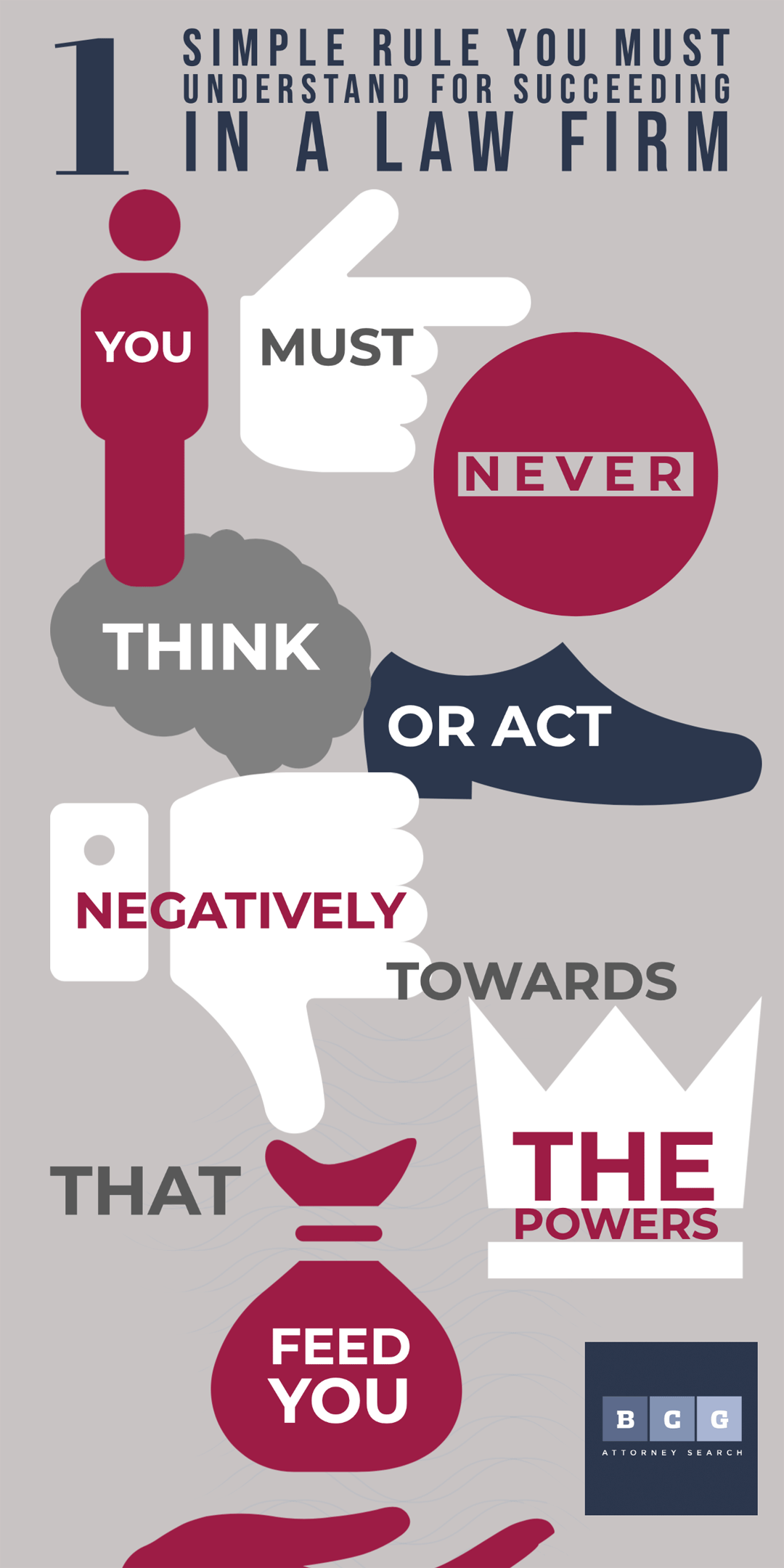Harrison Barnes' Legal Career Advice Podcast - Episode 64
Summary: Why do some attorneys succeed in large, prestigious law firms and others fail? The reason generally does not have to do with how smart a given attorney is or where the attorney went to law school. The real answer has to do with whether or not the attorney follows one simple rule having to do with how much of a positive influence the attorney is within the law firm environment.


|
| Harrison Barnes |
When an attorney starts at any law firm, the attorney will quickly be introduced to various people within the firm who will share a negative view of the firm and, when it comes to firm management (i.e., the people who support the attorney and provide the attorney with a job), will speak in terms of “us versus them.” In fact, most attorneys who work in law firms are exposed to a literal parade of people coming into their offices, going out to lunch with them, texting them, taking them out for drinks, emailing them and calling them on the phone to discuss how things are so negative and wrong inside of their law firms.
- The people instigating these conversations and negative way of thinking never last inside of law firms.
- In most instances, the people who choose to listen to and participate in this way of thinking also will be gone in short order.
This rule should be tattooed on the arm of every law student and attorney out there. It is the people who do not understand this simple rule who are responsible for the majority of the angst and negativity associated with the legal profession. Additionally, many highly qualified attorneys—who otherwise would be successful in the legal profession—leave the practice of law because they do not understand this one simple rule.

The dumbest and most self-destructive (career-wise) thing that associates, partners and others inside of law firms can do is to show in any way that they are against or in conflict with firm management. Incredibly, however, the majority of attorneys (even those with excellent pedigrees) fail in the largest firms because they do not understand and follow this simple, obvious rule. Instead, the people who succeed inside of the largest law firms (and many of them have lesser pedigrees) are the people who understand and follow this one simple rule.
I know of attorneys who follow this rule and have had extraordinary careers. One such attorney has been the right hand man of a partner with $30-million in business his entire career. He would hardly ever say anything negative about anyone. With no business, this attorney has had a great career in all respects and consistently earns well over $1-million a year just being a follower. If you were the partner with $30-million in business, who would you want around you? Would you want someone who was against you, or would you want someone who would always support you, never say anything negative and follow you to the ends of the earth? If you were a leader, would you want someone negative working for you or someone positive?
The majority of attorneys I speak with do not understand this rule. The attorneys who are hired (and remain employed) by the largest and most prestigious law firms all understand this rule. Law firms want to hire people whom they believe will be on the same team. Partners, associates and others constantly move firms because they do not understand this rule. Law firms are constantly hiring lateral attorneys because they have let go people who do not understand this rule and are trying to find attorneys who do.
I know of one partner with a large $10-million book of business who moves law firms every few years. He joins a new law firm and within a short time begins fighting with management about how much money he should be taking home, how much support he should get and more. He starts writing all sorts of letters back and forth to management and things quickly become contentious and then he moves. He has done this at least four times over the past decade—and he is getting a reputation. Major law firms are coming to understand his pattern of negative behavior and choose to avoid him rather than risk their work environments becoming toxic.
The reason there is generally so much turn over, bias against senior attorneys, bias against attorneys with multiple moves on their resume, bias against attorneys who have gone in-house, bias against attorneys who have been laid off or fired from previous jobs—and so forth—is simply because law firms want to keep negative people out. It is bad for business. It makes the law firm an unpleasant place to work and govern. It hurts the quality of service that clients receive. The entire economic model of the modern American law firm revolves around keeping negative attorneys out while keeping in positive attorneys who support the management.
As time has gone by, this challenge has become easier and easier for law firms. Law firms know who the trouble-makers are and when they see people associating with these sorts of people they put two and two together and assume they are the enemy as well. In this day and age, law firms also use screen-recording technology and I have seen associates at major law firms fired for posting messages about their law firm online. I have even seen attorneys harshly reviewed for spending too much time on attorney tabloid websites. Firms are well aware of which attorneys are making trouble.
Incredibly, most attorneys with their top law school degrees, 2,400 billable hour years and major law firm resumes do not understand the simple rule that law firms want to keep positive people around and exorcize negative people. Instead of understanding the importance of supporting those they are working for, too many otherwise top-quality attorneys spend time criticizing them, biting the hand that feeds them and associating with people on the way out.
In general, once the leadership of a law firm gets a hint that you are against it, you will become someone the firm will generally stop favoring and whom the firm wants to oust. People stay in power, make money and are successful to the extent they minimize their enemies, ensure there is not dissent among the people below them and keep everyone happy. Attorneys who are not part of the “tribe” that is in power will be pushed out and expelled like a virus. This happens in a number of ways, including:
- Not being given work;
- Given nothing but busy work;
- Being reviewed harshly;
- Given too much work;
- Being ignored;
- Not being helped with assignments;
- Getting laid off;
- Getting fired; or,
- Getting asked to leave.
While attorneys may believe that the issues they are experiencing inside of a law firm are performance related, in most cases performance has nothing to do with it. I have seen attorneys make incredible mistakes that defy any and all explanation and keep their jobs (and get promoted) because they were on the right side of management. When the management and leadership of the firm favors you there is literally no mistake you can make that is too large.
Here are some examples of mistakes that shock the conscience, but that law firms “laughed off” when an attorney they liked was involved:
- An attorney took some clients out golfing. The attorney got drunk, took his clothes off and passed out in a dumpster behind a Target by the golf course. The client taped $20 to his forehead so he could get home. The attorney was promoted to partner a few weeks later.
- A junior partner attorney on a large trial team got in a fight with a prostitute in his hotel room in the middle of the night before a big trial. The police were called and the attorney was charged with hitting the prostitute. The entire trial team was kicked out of the hotel and they needed to find a new hotel in the middle of the night.
- An associate attorney forgot to file an important motion in a major case. The entire case was dismissed and the client lost the case. The law firm spent hundreds of thousands of dollars fighting to get the case back on track and eventually did. The attorney was promoted to counsel a few months later.
If the management of a law firm likes you and believes that you are on its side, you can often literally do no wrong. In contrast, if the law firm does not believe you are on its side, the firm will go out of its way to make life unpleasant for you and get rid of you. Law firms crush those who are not on their sides and the entire politics and hiring apparatus of major law firms revolves around constantly “churning and adding to the pot” to increase the percentage of firm supporters.
As a legal recruiter, I place numerous attorneys each month in major law firms who do not have the traditional pedigrees to be there—but they do have what the law firm is looking for—they follow the “One Simple Rule.” I do not concentrate on trying to place attorneys from the largest law firms, or the top law schools in other firms. I will happily work with these people, but it is often a time suck if I see obvious signs the attorney does not understand the One Simple Rule. The One Simple Rule applies to partner, associate and counsel hires. Most attorneys do not understand that law firms really want someone who will follow the One Simple Rule, as opposed to being narrowly focused on things like the attorney’s pedigree, experience and, for partners, business. Law firms like these things, but they value the attorney’s allegiance to the One Simple Rule far, far more.
The best law firms make the One Simple Rule a priority in all hiring decisions. When law firms begin to become unpleasant places to work and start to fall apart, these firms start to deemphasize the One Simple Rule, or not pay attention to it, and the law firm becomes even more of an unpleasant place to work.
When I am reviewing an attorney’s resume, I can generally tell how closely the attorney follows this rule. There are aspects of an attorney’s resume that are far more important than law school, grades and past jobs. The most important aspects of an attorney’s resume have to do with indicating whether or not the attorney follows the One Simple Rule.
Here are some things that prestigious law firms do not like and show whether or not you are following the One Simple Rule. Prestigious law firms that know what they are doing do not hire people with any of the below characteristics.
- Prestigious law firms do not like to hire people who have gone in-house. If an attorney goes in house, he or she generally does so because there is something about the law firm environment that he or she does not like—whether it is the hours, getting business, or something else. The attorney is likely to bring this doubt and negativity with him or her to the next job, or leave for another in-house opportunity in the future. Major law firms almost never hire attorneys who have gone in-house because they have shown they are unlikely to follow the One Simple Rule. (See The Dark Side of Going In-house for more information.)
- Prestigious law firms do not like to hire people who have spent their careers in the government—or done anything other than a clerkship, or a perhaps several years in the US Attorney’s Office. If an attorney has spent too much time in the government, the attorney has generally shown that he or she does not have the sort of drive that a law firm needs to stay successful and competitive. Attorneys who go into the government will often become very resentful when they get into a competitive law firm environment because the expectations will be too different. In addition, law firms presume there must be something wrong with the attorney for spending so much time in the government and not working in a law firm instead. These attorneys have shown they are unlikely to follow the One Simple Rule.
- Prestigious law firms do not like to hire attorneys (without business) who have more than eight years of experience. An attorney with more than eight years of experience who is moving firms is generally doing so because the attorney is not “making the cut” at his or her existing firm. If an attorney is not making the cut that means the attorney may not be viewed as enough of a supporter of management and no one is helping the attorney because the attorney may not be following the One Simple Rule. In addition, if an attorney is moving firms the attorney may be jaded and angry after so much time in a law firm without success. If an attorney shows, or has any form of resentment towards the attorney’s law firm, then it will look as if the attorney is not following the One Simple Rule. In general, most law firms believe that an attorney with more than eight years of experience who does not have significant business and is not a partner is likely to be at least somewhat defensive, angry and someone who is not following the One Simple Rule (or will not follow the rule at their next firm). Accordingly, these attorneys are rarely hired.
- Prestigious law firms do not like to hire attorneys who want to switch practice areas. If an attorney switches practice areas, he or she generally will want to switch firms, or even switch practice areas again in the future. These attorneys have shown they are not happy in their current law firms and this lack of happiness is something that will carry over to their next firms. In addition, if these attorneys were liked enough by the powers inside of their firms then their firms would likely have no issues with them switching practice areas. Attorneys who are in any way unsure about what they want to do are likely to be angry, resentful, uncommitted and have other characteristics that show they are not following the One Simple Rule and not be hired.
- Prestigious law firms do not like to hire attorneys who hold jobs for only a short period of time, or switch firms frequently. If an attorney frequently switches jobs, the only explanation for this in the eyes of most law firms is that he or she is doing so because he or she is unhappy, or not doing well in a succession of law firms. Because attorneys more often experience problems and issues in their law firms from not following the One Simple Rule than performance reasons (i.e., they are perceived as against the management), new law firms will generally believe the new attorneys are likely to be trouble. (See The Right and Wrong Reasons to Switch Law Firms for more information.)
- Prestigious law firms do not like to hire attorneys who have resumes that indicate they have been activists (of virtually any kind)—whether it is political, racial, sexual, or otherwise. Law firms generally will shy away from activists of all kinds. The simple reason for this is that the law firm knows that the attorney is likely to create trouble and find things wrong no matter where he or she goes. The activist attorney is someone who likely will constantly create issues and find reasons to be upset. Activists typically have an “us versus them” attitude and if a law firm picks up the least bit of scent of this the firm will not hire the person. People who have been activists generally do not follow the One Simple Rule. (See 6 Things Attorneys and Law Students Need to Remove from Their Resumes ASAP If They Want to Get Jobs with the Most Prestigious Law Firms for more information.)
- Prestigious law firms will never hire people who have ever sued a former employer, or written anything negative about a former employer, or even on social media posted anything that may have indicated less than 100% commitment to practicing law. Regardless of the circumstance, if an attorney has ever sued a former employer this generally is a very clear demonstration that the attorney does not follow the One Simple Rule. I once saw a ninth-year attorney who was moving with a group of attorneys to another major law firm have her offer revoked because she had written on a Facebook account something to the extent of: “I’m just practicing law so I have money to do my music—law is no fun.” BOOM … just like that her legal career was finished. The law firm revoked her offer and she did not get a new job and went off and did something else completely—losing out on a vital career in the process. The lesson is that law firms will deal harshly with anything that shows you do not follow the One Simple Rule, or even hints at it. (See The #1 Attorney Career Killer That Attorneys Are Never Taught for more information.)
- Prestigious law firms do not like to hire people who show lots of independence—they particularly, for example, generally do not like people who have been habitual entrepreneurs. If someone wants to start a business, or make a lot of money, that person should probably not be an attorney who wants to work in a prestigious law firm. Being an attorney is an academic profession that requires hard work, commitment and is not entrepreneurial. If someone is an entrepreneur, that person is going to quickly realize that he or she can make profoundly more money doing other things and leave the practice of law. They will also tell a lot of people in the firm this along the way and upset fellow associates, partners and others in the law firm. People who are always looking for the next best thing do not make good prestigious law firm attorneys. Attorneys who have independent ideas about their careers are not following the One Simple Rule.
- Prestigious law firms do not like to hire people who are overly ambitious and want to become extremely rich and successful. Just as if someone is entrepreneurial, someone who is overly ambitious is not likely to have a lot of patience for the politics of a law firm, or the compensation ups and downs of law firms. Law firms are looking for people who (within reason, of course) will take what they are given and offered. Law firms cannot run efficiently if people are so ambitious they are likely to be impatient about advancement—they will create trouble and become negative. Attorneys who are overly ambitious are not likely to be followers of the One Simple Rule.
- Prestigious law firms do not like to hire people who have been laid off, or fired from law firms. I hate this rule because it seems like it unnecessarily penalizes many good attorneys. The idea is, though, that if someone has ever been laid off or fired he or she is likely to be negative about this experience, negative about law firms and will bring this with him or her to the next law firm. I have never seen a laid off attorney rehired by the firm from which he or she was laid off. In contrast, I have seen the same law firms hire scores of the same type of attorney months after they have let go of the attorney. The reason for this, I believe, is because law firms simply do not want negativity in their midst. An additional fact is that law firms generally use layoffs as a way to get rid of negative people who are not following the One Simple Rule. When they lay people off, law firms figure out how to keep followers of the One Simple Rule.
- Prestigious law firms do not like to hire people who have been solo practitioners. Law firms are “group exercises” and places of “group activity” and where people need to show they can communicate with one another and help one another. Anyone who believes they can “do it on their own” is likely to bring this attitude with them to their new firm and this will undermine the institutional, “follow the leader” attitude needed to succeed in a major law firm.
While most recruiters and others seem obsessed with an attorney’s overall qualifications, I have found the majority of my placements are for attorneys who may not necessarily have the best qualifications but who are following the One Simple Rule.
One of the most interesting things I have noticed as a legal recruiter, for example, is that if an attorney is relocating from a city he or she did not grow up in to their “home” city, the attorney is far, far more likely to get a position with another major law firm than if he or she was simply trying to move firms in the city where he or she is currently working. It may seem strange, but it has always been the case. Attorneys who are relocating home (and have reasons for doing so) are generally considered to be leaving their current firms not because of any conflict with the management, but because they want to return home. It is also believed that if they move home they will be “rejoining” a team and will be loyal to that team. In contrast, attorneys moving firms in one city are often presumed to be doing so because they are in conflict with the management. At all points in time, every law firm is pushing out attorneys it believes are in conflict with it. It is far more likely for a law firm to push someone out because it believes that person is a danger to morale than it is for performance reasons.
Another frequent type of placement I make is of an attorney moving from a less prestigious to a more prestigious law firm. If an attorney has positioned his or her move as one in which he or she wants access to more sophisticated matters, larger clients and so forth, then this generally goes over well. An attorney who is excited about improving, doing better work and who loves the practice of law is not moving because of issues with the management, but rather due to a desire to improve and commit to a place that does more sophisticated work. Portraying a move in this sort of vein is something that works very well and raises no doubts as to whether the attorney is following the One Simple Rule.
Anytime an attorney is moving firms as a result of the attorney’s questioning the law firm model, questioning management, being angry and frustrated, or not being a team player, that attorney generally will have a difficult time getting hired. Law firms are constantly hiring people out of law school and others because they want people who are not negative and whom they hope will follow law firm leadership. The entire organism of a law firm is meant to retain supporters and expunge people who are not on the same team. Law firms want people who will commit and support management.
Unfortunately, the careers of most attorneys inside of law firms end unnecessarily—not because they cannot do the work but because they adopt the “us versus them” attitude that holds everyone on the “us” side back. When I talk with partners who are not succeeding, associates who are not succeeding, and counsel who are not succeeding, in virtually every conversation it comes out that they do not view themselves on the same team as the people they are working for. In contrast, when I talk to attorneys who are succeeding all they talk about is how they are on the same team as the people running the law firm.
Many law firms have managed to largely keep people on the same team. Some of the best names in the legal profession—Munger Tolles, Latham & Watkins, Sullivan & Cromwell, Wachtell Lipton, Gibson Dunn, Cravath Swaine & Moore—are successful and have endured largely because they are so good at nurturing and maintaining a culture where everyone views themselves on the same team and this comprises the overall culture of the firm. In contrast, law firms that have failed—Dewey LeBeouf, Brobeck, Finley Kumble—all did so precisely because they allowed their firms to splinter and everyone not to be on the same team where the One Simple Rule was not being followed. Just as an attorney’s success is dependent on following the One Simple Rule, so too is the success of a law firm.
I have certainly seen numerous attorneys who followed the One Simple Rule fail, but it is rare. In contrast, however, I see attorneys every single day who have failed in their legal careers from not following the One Simple Rule. More so than anything you do in your career, following the One Simple Rule is the one thing that will make you successful.
While this might not seem like a difficult choice, it is a huge choice and one that ultimately will control the course of your career. A good proportion of attorneys get this choice wrong and as a result they do not have careers that are anywhere near as successful or satisfying as they might otherwise have been.
- Applying this principle is illustrated in our Baker & Hostetler LLP insider guide, where success depends on aligning with the firm’s culture and expectations.
About Harrison Barnes
No legal recruiter in the United States has placed more attorneys at top law firms across every practice area than Harrison Barnes. His unmatched expertise, industry connections, and proven placement strategies have made him the most influential legal career advisor for attorneys seeking success in Big Law, elite boutiques, mid-sized firms, small firms, firms in the largest and smallest markets, and in over 350 separate practice areas.
A Reach Unlike Any Other Legal Recruiter
Most legal recruiters focus only on placing attorneys in large markets or specific practice areas, but Harrison places attorneys at all levels, in all practice areas, and in all locations-from the most prestigious firms in New York, Los Angeles, and Washington, D.C., to small and mid-sized firms in rural markets. Every week, he successfully places attorneys not only in high-demand practice areas like corporate and litigation but also in niche and less commonly recruited areas such as:
- Immigration Law
- Workers Compensation
- Insurance
- Family Law
- Trust and Estate
- Municipal law
- And many more...
This breadth of placements is unheard of in the legal recruiting industry and is a testament to his extraordinary ability to connect attorneys with the right firms, regardless of market size or practice area.
Proven Success at All Levels
With over 25 years of experience, Harrison has successfully placed attorneys at over 1,000 law firms, including:
- Top Am Law 100 firms such including Sullivan and Cromwell, and almost every AmLaw 100 and AmLaw 200 law firm.
- Elite boutique firms with specialized practices
- Mid-sized firms looking to expand their practice areas
- Growing firms in small and rural markets
He has also placed hundreds of law firm partners and has worked on firm and practice area mergers, helping law firms strategically grow their teams.
Unmatched Commitment to Attorney Success - The Story of BCG Attorney Search
Harrison Barnes is not just the most effective legal recruiter in the country, he is also the founder of BCG Attorney Search, a recruiting powerhouse that has helped thousands of attorneys transform their careers. His vision for BCG goes beyond just job placement; it is built on a mission to provide attorneys with opportunities they would never have access to otherwise. Unlike traditional recruiting firms, BCG Attorney Search operates as a career partner, not just a placement service. The firm's unparalleled resources, including a team of over 150 employees, enable it to offer customized job searches, direct outreach to firms, and market intelligence that no other legal recruiting service provides. Attorneys working with Harrison and BCG gain access to hidden opportunities, real-time insights on firm hiring trends, and guidance from a team that truly understands the legal market. You can read more about how BCG Attorney Search revolutionizes legal recruiting here: The Story of BCG Attorney Search and What We Do for You.
The Most Trusted Career Advisor for Attorneys
Harrison's legal career insights are the most widely followed in the profession.
- His articles on BCG Search alone are read by over 150,000 attorneys per month, making his guidance the most sought-after in the legal field. Read his latest insights here.
- He has conducted hundreds of hours of career development webinars, available here: Harrison Barnes Webinar Replays.
- His placement success is unmatched-see examples here: Harrison Barnes' Attorney Placements.
- He has created numerous comprehensive career development courses, including BigLaw Breakthrough, designed to help attorneys land positions at elite law firms.
Submit Your Resume to Work with Harrison Barnes
If you are serious about advancing your legal career and want access to the most sought-after law firm opportunities, Harrison Barnes is the most powerful recruiter to have on your side.
Submit your resume today to start working with him: Submit Resume Here
With an unmatched track record of success, a vast team of over 150 dedicated employees, and a reach into every market and practice area, Harrison Barnes is the recruiter who makes career transformations happen and has the talent and resources behind him to make this happen.
A Relentless Commitment to Attorney Success
Unlike most recruiters who work with only a narrow subset of attorneys, Harrison Barnes works with lawyers at all stages of their careers, from junior associates to senior partners, in every practice area imaginable. His placements are not limited to only those with "elite" credentials-he has helped thousands of attorneys, including those who thought it was impossible to move firms, find their next great opportunity.
Harrison's work is backed by a team of over 150 professionals who work around the clock to uncover hidden job opportunities at law firms across the country. His team:
- Finds and creates job openings that aren't publicly listed, giving attorneys access to exclusive opportunities.
- Works closely with candidates to ensure their resumes and applications stand out.
- Provides ongoing guidance and career coaching to help attorneys navigate interviews, negotiations, and transitions successfully.
This level of dedicated support is unmatched in the legal recruiting industry.
A Legal Recruiter Who Changes Lives
Harrison believes that every attorney-no matter their background, law school, or previous experience-has the potential to find success in the right law firm environment. Many attorneys come to him feeling stuck in their careers, underpaid, or unsure of their next steps. Through his unique ability to identify the right opportunities, he helps attorneys transform their careers in ways they never thought possible.
He has worked with:
- Attorneys making below-market salaries who went on to double or triple their earnings at new firms.
- Senior attorneys who believed they were "too experienced" to make a move and found better roles with firms eager for their expertise.
- Attorneys in small or remote markets who assumed they had no options-only to be placed at strong firms they never knew existed.
- Partners looking for a better platform or more autonomy who successfully transitioned to firms where they could grow their practice.
For attorneys who think their options are limited, Harrison Barnes has proven time and time again that opportunities exist-often in places they never expected.
Submit Your Resume Today - Start Your Career Transformation
If you want to explore new career opportunities, Harrison Barnes and BCG Attorney Search are your best resources. Whether you are looking for a BigLaw position, a boutique firm, or a move to a better work environment, Harrison's expertise will help you take control of your future.
Submit Your Resume Here to get started with Harrison Barnes today.
Harrison's reach, experience, and proven results make him the best legal recruiter in the industry. Don't settle for an average recruiter-work with the one who has changed the careers of thousands of attorneys and can do the same for you.
About BCG Attorney Search
BCG Attorney Search matches attorneys and law firms with unparalleled expertise and drive, while achieving results. Known globally for its success in locating and placing attorneys in law firms of all sizes, BCG Attorney Search has placed thousands of attorneys in law firms in thousands of different law firms around the country. Unlike other legal placement firms, BCG Attorney Search brings massive resources of over 150 employees to its placement efforts locating positions and opportunities its competitors simply cannot. Every legal recruiter at BCG Attorney Search is a former successful attorney who attended a top law school, worked in top law firms and brought massive drive and commitment to their work. BCG Attorney Search legal recruiters take your legal career seriously and understand attorneys. For more information, please visit www.BCGSearch.com.
Harrison Barnes does a weekly free webinar with live Q&A for attorneys and law students each Wednesday at 10:00 am PST. You can attend anonymously and ask questions about your career, this article, or any other legal career-related topics. You can sign up for the weekly webinar here: Register on Zoom
Harrison also does a weekly free webinar with live Q&A for law firms, companies, and others who hire attorneys each Wednesday at 10:00 am PST. You can sign up for the weekly webinar here: Register on Zoom
You can browse a list of past webinars here: Webinar Replays
You can also listen to Harrison Barnes Podcasts here: Attorney Career Advice Podcasts
You can also read Harrison Barnes' articles and books here: Harrison's Perspectives
Harrison Barnes is the legal profession's mentor and may be the only person in your legal career who will tell you why you are not reaching your full potential and what you really need to do to grow as an attorney--regardless of how much it hurts. If you prefer truth to stagnation, growth to comfort, and actionable ideas instead of fluffy concepts, you and Harrison will get along just fine. If, however, you want to stay where you are, talk about your past successes, and feel comfortable, Harrison is not for you.
Truly great mentors are like parents, doctors, therapists, spiritual figures, and others because in order to help you they need to expose you to pain and expose your weaknesses. But suppose you act on the advice and pain created by a mentor. In that case, you will become better: a better attorney, better employees, a better boss, know where you are going, and appreciate where you have been--you will hopefully also become a happier and better person. As you learn from Harrison, he hopes he will become your mentor.
To read more career and life advice articles visit Harrison's personal blog.











